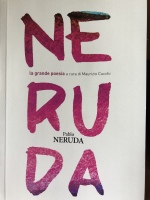book recs! Catullo
May. 30th, 2021 03:38 pm
As promised, Catullo!
I love so many of Catullo’s carmina (plural of Latin’s carmen, “poem”) that I actually had some difficulty choosing what I wanted to talk about. Catullo has been such an influential Latin poet that some of his poems are still quite popular nowadays.
In his carmina, he moved the spotlight from classical heroes to his personal life, with his emotions, love troubles, his troubles with money, with people.
He truly is an author who likes to bitch about people, other influential authors of his time, politicians, the people his lovers preferred to bed, their lack of money, his own lack of money.
(Which is a bit hilarious when you find out that he was from a rich family, but he basically dropped them to go live on friends’ couches, starving whenever he didn’t make enough money with his poetry, but enjoying the bohemian life before it was even popular.)
The people he wrote more about in his love poems were Lesbia - the rich (married) woman he fell in love with and with whom he had a tumultuous love and sexual life - and Giovenzio, a boy he fell in love with, who Catullo hoped would return his feelings.
His more popular poem is probably “Vivamus mea Lesbia, atque amemus” (“Let us live, my Lesbia, and love”), the Carmen 5, with its notorious
“Give me a thousand kisses, then a hundred,
then another thousand, then again a hundred,
then right away another thousand, and then a hundred.
Then, when we have collected many thousands, we’ll mix them up so not to know how many times we kissed and no malevolent people could jinx us knowing there has been so many kisses.”
I have a couple problems here with the translations I found on the internet because many go for “then a second hundred” instead of “then again a hundred”. Which, I get the confusion since the original is “dein secunda centum”, but secunda was in Latin about time. It meant “a second time”, to which my translation as “again.”
Another problem for me is the fact many seem to simply skip the translation of the “usque” in the “deinde usque altera mille”, translating it as a simple “and yet another thousand” while usque here is about a continuous of the action, it’s a “and then without stopping”, “and then right away”.
But this is the problem with translating a dead language: everybody is simply trying their best and even if I don’t like some translations I’m pretty sure many won’t like mine. In the end it’s all interpretations.
But I think my favorite poem is the Carmen 109:
Oh my life, you promise me that this love of ours will be carefree and eternal.
Great Gods, do so that she can promise the truth,
that she’ll speak truly, from the bottom of her heart,
so that it will be granted us for the rest of our lives,
to carry on this eternal vow of sacred friendship.
Oh boy, translating this one is really complicated when you realize that he was writing poetry and you have to find a way to make it understood rhetoric figures that were already a little jump for Latins.
Take the “from the bottom of her heart”: in the original it’s “ex animo”, which means from the soul, but the meaning that everybody would have understood was him saying “from the bottom of her heart”. And this “ex animo” represents a climax in the use of “vere”, “sincere” and then “ex animo”, with the focus moving from something objective and true to something subjective, interior to the person, that it’s based on her personal feelings.
And there is much to be said about the final “sanctae foedus amicitiae”, because foedus is basically a contract stipulated between parties, with sanctions to come to whoever breaks it; and sanctae is sacred, but it’s not only in the religious sense but a political one: it’s something that should not be violated, like a law. And, since this is working as an adjective to foedus, it works to give us the image of a vow between people that should not be violated, hence the call for the Gods to watch over it (and possibly punish who betrays the pact?).
Another utterly lovely poem is the Carmen 48 he wrote for Giovenzio:
Your eyes of honey, oh Giovenzio,
if someone would let me kiss them continuously,
I’d kiss them up to three hundred thousand times,
and I’d feel still like I’m not satisfied,
even if thicker than the ripe ears
it was the harvest of my insatiable kissing.
There is so much emotion in his love poems that I can’t help but put Catullo between my favorites <3
Translations are mine, if there are mistakes just know I did my best <3




